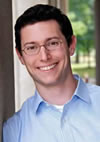Wikipedia in the University

Peter Shulman, Ph.D. - Assistant Professor of History at Case Western Reserve University |
Friday November 18, 2011
12:30-1:30 p.m.
Special Location: The Guilford Lounge, First Floor of Guilford House
Case Western Reserve University
Dear Colleagues:
It’s a puzzle and a challenge for both professors and students. Is Wikipedia an acceptable reference for academic work? There are some logical reasons to say it is not. Validation in the academic world is usually based on either credentials or review by other experts. Scholars in a field know which outlets have (or are supposed to have) good review processes, and which credentials count. Wikipedia appears to be a resource of, by and for amateurs.
But it’s not that simple. Wikipedia is hard to avoid if you are searching on the internet. It’s seductive, at least as a point of entry for a scholar looking for an introduction to a field. Moreover, many credentialed experts have their own biases –a Ph.D. or even publication in a leading journal is no guarantee of accuracy.
So notions of whether and how students (or professors!) should use Wikipedia may be changing. How, and to what end? Professor Shulman has commented that, “saying it’s off-limits won’t stop students from using it, so I’ve switched to helping students understand when it’s useful and when it’s not.” How can that be done? Join us to hear, and to share your thoughts.
Very best regards,
Joe White
Luxenberg Family Professor of Public Policy and Director, Center for Policy Studies
About Our Guest...
Peter Shulman studies technology, science, and American politics in the 19th and 20th centuries, with special interests in the history of energy, environmental history, communication and transportation, and the history of American foreign relations. He teaches courses in the history of technology, energy and the environment, historical methods, and contemporary history.
Where We Meet
This year the Friday Public Affairs Lunch usually convenes each Friday when classes are in session in the Dampeer Room of Kelvin Smith Library from 12:30 pm to 1:30 pm. The Dampeer Room is on the second floor of the library. If you get off the elevators, turn right, pass the first bank of tables, and turn right again.
Parking Possibilities
The most convenient parking is the lot underneath Severance Hall. We regret that it is not free. From that lot there is an elevator up to street level (labeled as for the Thwing Center); it is less than 50 yards from that exit to the library entrance.
There is also on-street parking on both East Drive and Bellflower. Both are fairly short walks from the library.
Friday Lunch Upcoming Topics and Speakers:
November 25: No Session - Thanksgiving Break
December 2: University Circle Update. Steven Litt, Architecture Critic, Cleveland Plain Dealer
December 9: Outsourcing and Offshoring Legal Services. Cassandra Burke Robertson, Associate Professor of Law |
|
November 14, 2011
If you would like to reply, submit items for inclusion, or not receive this weekly e-mail please send a notice to: padg@case.edu
Upcoming
Events
The Berlin Wall After 50 Years
Hope M. Harrison, Ph.D., Associate Professor of History and International Affairs, The George Washington University, November 30, 2011, 5:00-6:30 p.m., Clark 309, Case Western Reserve University, Sponsored by the Max Kade Center for German Studies.
Fifty years ago on August 13, 1961, the East Germans sealed the border between East and West Berlin and began to build what became known as the Berlin Wall. The Wall symbolized the global Cold War conflict and the repression of communism, and its peaceful fall on November 9, 1989 signaled the end of the Cold War and of communism in Europe.
Based on extensive research in archives in Moscow and Berlin, Professor Hope M. Harrison will illuminate the secret behind-the-scenes maneuvers between the East German and Soviet leaders which led to the building of the Wall, including her surprising findings about the ways in which the aggressive East German leadership pushed the reluctant Soviets into agreeing to seal the border in Berlin. She will also discuss recent debates in unified Germany about the history and legacy of the Berlin Wall, based on her extensive interviews and research in Berlin on the subject.
Views on the history of the Berlin Wall and how it should be commemorated have become highly politicized in Germany, particularly around the anniversaries of the erection and fall of the Wall. This year's 50th anniversary of the Wall was no exception. Germany is in the midst of a second coming to terms with difficult aspects of its past, focusing this time on the communist East Germany past, but the process is strongly influenced by how Germany has come to terms with its Nazi past.
S |
M |
T |
W |
T |
F |
S |
|
|
1 |
2 |
3 |
4 |
5 |
6 |
7 |
8 |
9 |
10 |
11 |
12 |
13 |
14 |
15 |
16 |
17 |
18 |
19 |
20 |
21 |
22 |
23 |
24 |
25 |
26 |
27 |
28 |
29 |
30 |
|
|
|
About the Friday Lunch Newsletter
If you would like to reply, submit items for inclusion, or not receive this weekly e-mail please send a notice to: padg@case.edu.
|
|